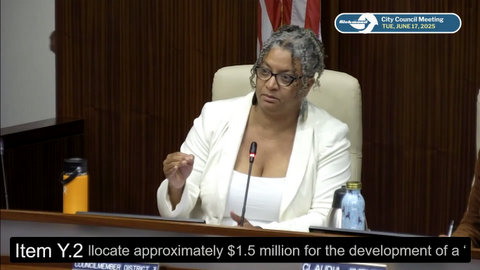
18 Jun City to Investigate ‘State of Black Richmond’

“It’s not that you don’t serve anybody else, you focus on where the problem is the worst and save that life,” Richmond City Council member Doria Robinson said Tuesday. (Screenshot captured by Samantha Kennedy / The CC Pulse)
By Samantha Kennedy
The Richmond City Council will commission a “State of Black Richmond” report to investigate the disproportionate challenges Black residents face and how they can be solved.
Officials on Tuesday unanimously backed the $1.5 million Black Resiliency project and fund that will include a report examining barriers to city services and establish a community grant program to support projects to improve Black residents’ experiences.
Council members Doria Robinson, Claudia Jimenez and Sue Wilson co-sponsored the item, citing a Black exodus in the last four decades, the number of homeless residents who are Black in the city — 57% in 2023, according to one study — and several health and crime disparities as reasons for the funding.
“And when you have a problem that is hitting a population in this way, you focus your efforts just like in an emergency room,” said Robinson. “It’s not that you don’t serve anybody else, you focus on where the problem is the worst and save that life.”
The direction also includes the creation of a community advisory committee that will oversee the project and propose funding recommendations for programming.
Of the more than half a dozen residents who spoke during public comment, most were supportive of the project for placing a focus on a community they felt had been overlooked.
Council member Jamelia Brown said she was supportive of the project but did not want to duplicate research efforts that had already taken place.
“When you are mentioning the different reports that have current data, why would we allocate any funding for a new report?” Brown said.
In 2024, Brown mentioned, the Contra Costa County Board of Supervisors commissioned a $7.5 million feasibility study for an African American Holistic Wellness Hub. The study included over 4,000 survey respondents, 16 listening sessions and town halls across county districts.
Ceres Policy Research, which conducted the feasibility study, proposed that the wellness hub be located in Antioch. In April, the Antioch City Council formally supported the hub, which would offer culturally competent mental, physical and other services.
Antioch and Richmond have some of the largest Black populations in the county, according to 2024 data from the U.S. Census Bureau. Antioch’s Black population has risen over the decades, largely due to the cost of living, in comparison with Richmond’s decline.
But historical and current racial trauma in Black communities of both cities, including Richmond’s historical presence of the Ku Klux Klan, resident displacement and anti-Black racism in the West Contra Costa school district, has pushed officials to allocate resources to better serve Black residents.
Robinson said that while pulling data from other reports that have been done countywide could be done, the focus of this new report would be on Black residents in the city.
“I think that it’s important that we know specifically what is happening here in our unhoused community, or here with our housing stock, with our kids,” she said, noting that there may be gaps in current data.
Brown also unsuccessfully attempted to have some of the $1.5 million fund a race equity officer for the city. Council members in October voted to hire the equity officer, but City Manager Shasa Curl said Tuesday that another employee had instead been promoted with the understanding that race equity responsibilities would be part of their job description.
The city’s allocation also comes days before Juneteenth, which celebrates the end of slavery in the country and is considered the second independence day. The city is hosting its own celebration on June 21 from 10 a.m. to 6 p.m. at Nicholl Park.






No Comments